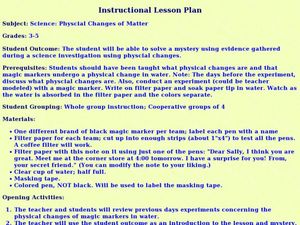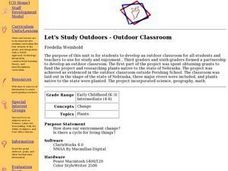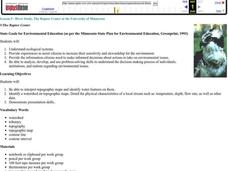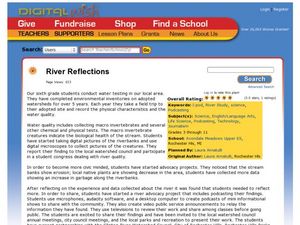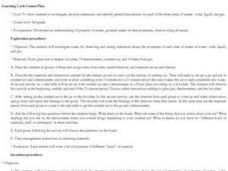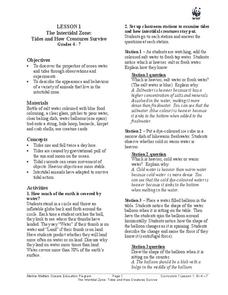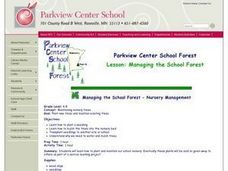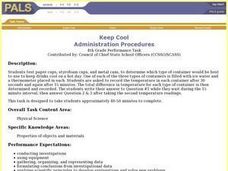Curated OER
Survival Science: How Evaporation and Condensation Can Save Your Life!
Eighth graders demonstrate how scientific principles can be used to provide resources in an emergency situation. In this evaporation instructional activity students view a demonstration on a solar still and see a brief PowerPoint...
Curated OER
Identifying Acids and Bases
Sixth graders observe the physical and chemical change that can occur in an acid and a base. In this acids and bases lesson plan, 6th graders use cabbage juice to identify, compare, and contrast acids and bases.
Curated OER
Physical Changes of Matter
Students solve a mystery using evidence gathered during a science investigation. In this physical changes lesson, students analyze a note written in marker to determine the physical changes the ink from the pen underwent. Students...
Curated OER
Let's Study Outdoors - Outdoor Classroom
Learners research native plants. They identify the plant by scientific name, size, amount of water needed and color. Pupils measure and plot an area of school property. Students create an outdoor classroom. Additional cross curriculum...
Curated OER
Robots
Students explore the two kinds of fluids: liquids and gases. They explain that liquids (water), unlike gases (air), cannot be compressed. This property makes them ideal for hydraulic work applications.
Curated OER
Carbon Dioxide: The Heat is On
Students examine the greenhouse gases affecting the atmosphere. In groups, they participate in activities in which they examine the effects of heat on the atmosphere and phytoplankton. They research how the phytoplankton differ in warm...
Curated OER
Ocean Currents
Students label the names, relative temperature, distribution, and direction of flow of major ocean currents on a world map. They also explore and model the natural forces that affect the movement of ocean currents through demonstrations...
Curated OER
River Study
Learners explore a stream in their area and show the class the topographic map of the stream. They locate the topographic map and name the streams, lakes and ponds in their watershed. They write a paragraph about their stream and...
Curated OER
River Reflections
Sixth graders create podcasts and video public service announcements. In this environmental advocacy lesson, 6th graders study the local watershed and become advocates for their local environment. In the process, they create podcasts and...
Alabama Learning Exchange
I'm so Crushed
As an experiment is demonstrated for them, students write down their observations and brainstorm questions that can help them understand what they saw. After watching the experiment again—which demonstrates a soda can collapsing due to...
Curated OER
Leaf Transpiration
Young scholars determine the amount of water loss due the transpiration.
Curated OER
Science: Liquid Matter
Second graders examine the properties of liquids and their classifications. They compare and contrast cups of different liquids and record their findings in journals. Students observe how liquids flow at various speeds and that unlike...
Curated OER
The Same But Different
Fourth graders identify the characteristics of a simple physical change. They describe objects by the properties of the materials from which they are made. Students discuss the different states of matter and their distinct physical...
Curated OER
Learning Cycle Lesson Plan
students investigate, develop inferences, and identify general descriptions for each of the three states of matter - solid, liquid, and gas. students investigate water, by observing and stating inferences about, the properties of each...
Curated OER
Sink or Swim
Students define density and explain how to determine the density of an object. Students participate in a demonstration that shows the differences in the densities of different liquids and how they affect the liquid's physical properties.
Curated OER
Laboratory - Density of a Material
Middle schoolers conduct a lab (with water, guar gum and sodium borate) and carefully record physical and chemical properties and changes throughout the session, and experiment with weighing by difference.
Curated OER
The Intertidal Zone: Tides and How Creatures Survive
Students study the properties of ocean water and tides and learn about animals that live in intertidal zones. In this intertidal zone lesson, students participate in classroom stations to learn about fresh water and salt water, cold...
Curated OER
MANAGING THE SCHOOL FOREST
Students study how to plant a seedling, how to mulch the trees into the nursery bed, transplant seedlings to another site or school, and determine why we need to water and mulch trees.
Curated OER
Keep Cool
Pupils design an experiment to determine which type of container would be best to use to keep drinks cool on a hot day. Students test paper cups, styrofoam cups, and metal cans by filling them with ice water and they use a thermometer...
Curated OER
Float or Sink?
Students examine why some objects float while others do not. They place various objects in water to observe their floating capability. Students record the object, its weight, and if the object floated. They construct a graph plotting...
Curated OER
Snail Observation Exercise
Young scholars are given a pond snail in a clear glass and asked to make observations on the snail's form and behavior. One of the key ideas is that seemly common subjects (like snails) often have surprising or interesting properties.
Curated OER
Waves: Understanding the Motion of Waves
Students demonstrate the motion of waves. In this wave lesson, students demonstrate the various attributes to waves and the properties through a variety of hands-on activities.
Curated OER
Physical Difference and Classification
Students use a microscope and observation skills to compare and contrast several physical properties and develop a classification system.
Curated OER
Color Dots 3
Students make simple observations, test mixtures, and make generalized inferences from their observations. They observe bleeding of colored inks with water.
Other popular searches
- Water Properties
- Chemical Properties of Water
- Physical Properties of Water
- Properties of Water Salinity
- Science Properties of Water
- Properties of Water Labs
- Water Chemistry Properties
- The Properties of Water
- Three Properties of Water
- Water Science Properties
- Properties Water Evaporation
- Water +Science +Properties




